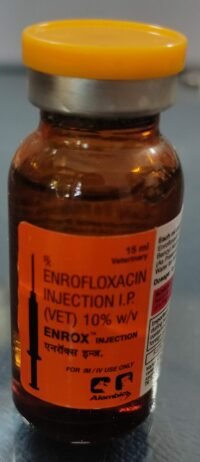Each ml Contains
Sulphadiazine I.P.: 400 mg Trimethoprim I.P. : 80 mg
Indications:
• Infections of gastrointestinal, respiratory & urogenital tract
• Specific infections like Colibacillosis, Ehrlichiosis, Actinomycosis, Hemorrhagic septicemia, Infectious keratitis, Arthritis, Mastitis, Nocardiosis, Pneumonia, Salmonellosis, Strangles, Coccidiosis, Pneumonia, Toxoplasmosis, etc.
MECHANISM OF ACTION
Therapeutic doses of sulfonamides are usually administered PO (Oral) except in acute life-threatening infections when IV infusions are used to establish adequate blood concentrations as rapidly as possible. Absorption occurs readily from parenteral injection sites: effective antibacterial concentrations are reached In <1 hr, and peak concentrations In -4 hr. Sulphadlazlne and Trimethoprim diffuse extensively Into tissues and body fluids. Tissue concentrations are often higher than the corresponding plasma concentrations, especially In lungs, liver, and kidneys. The plasma half-life of sulfadiazine Is 10.1 hr in cattle and the plasma half-life of trimethoprim Is >12 hr, with the result that the frequency of administration Is usually 12-24 hr.
The combination has efficacy for susceptible bacterial infections (gram-negative and gram-positive), including respiratory infections, soft tissue and skin infections, wounds, abscesses, and urogenital infections. The combination also is used occasionally for infections caused by protozoa (e.g., coccidial and Toxoplasma
infections). The combination has not been successful for treating infections in abscesses or infections caused by anaerobic bacteria, possibly because of interactions with the material in necrotic tissues.
Adverse Reactions and Side Effects
Adverse effects associated with sulfonamides in dogs include allergic reactions, Type II and Type III hypersensitivity, arthropathy, anemia, thrombocytopenia, hepatopathy, and keratoconjunctivitis sicca, and skin reactions. Dogs may be more sensitive to sulfonamides than other animals because dogs lack the ability to
acetylate sulfonamides to metabolites; therefore more toxic metabolites may accumulate in some animals.
Dogs and Cats
• 15 mg/kg q12h PO or 30 mg/kg q12-24h PO.
• Toxoplasma: 30 mg/kg q12h PO.
Large Animal Dosage
Cattle
Trimethoprim is not absorbed orally in ruminants, but it is absorbed in calves. Trimethoprim + sulfadoxine has been used in cattle (16 mg/kg combined drug every 24 hours IV or IM.
1 ml per 30 kg body weight for 3-5 days by deep intramuscular route



